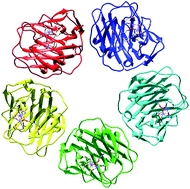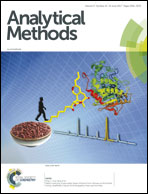C-Reactive protein: a major inflammatory biomarker
Abstract
Inflammatory biomarkers are released during tumour growth, and they are highly associated with stages of cancer progression. C-Reactive protein is one of the widely studied marker proteins, which is associated with inflammation. CRP levels have been used to predict survival in patients with different cancers. The assimilation of CRP into prognostic models for cancers improves their predictive accuracy. The analysis of changes in CRP concentration over time can allow for the prediction of tumour aggressiveness and treatment efficacy. Therefore CRP can be an important biomarker for cancer diagnosis and prognosis, and the monitoring of treatment outcomes. This critical review focuses on the role of C-reactive protein in different types of cancers and its relation to the different stages of cancer. This article also focuses on recently reported methods for the detection of CRP.



 Please wait while we load your content...
Please wait while we load your content...